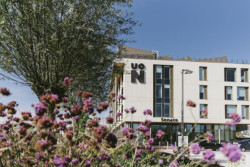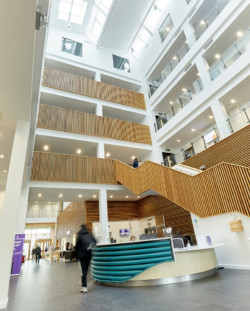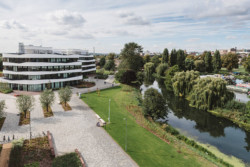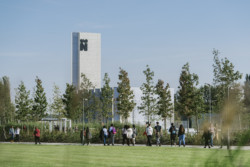
Claire Drakeley
Senior Lecturer in Events Management
Faculty of Business and Law
DiscoverGet in touch with us as we may be able to offer you a place for September 2024 through Clearing.
UCAS Code
BA: N820
BA with Foundation: N822
Level
UndergraduateUG
BA (Hons)Duration
Full Time: 3 Years
Foundation: 4 Years
Part Time: 4 - 6 Years
Starting
September
BCC at A Level
DMM at BTEC
UK Fees 24/25
Full Time: £9,250
Part Time: £1,540 (per 20 credit module)
Foundation: £9,250
International Fees 24/25
Full Time: £15,200
Foundation: £15,200
Location
For questions regarding study and admissions please contact us:
The University of Northampton’s Events Management degree offers a practical approach to the successful management of a wide range of events. Experiences are at the heart of this Events Management course so you will get to plan and deliver an event every year. There are numerous opportunities throughout our events management course for you to engage in work placements, project work and to network with successful events businesses. Our links with industry provide you with opportunities to gain valuable work experience alongside your studies.
The University of Northampton is a top 10 institution for Hospitality, Events Management and Tourism for Career Prospects (after 15 months) in the Best UK University Guardian League table for 2024.
Professional body: The Association for Events Management Education (AEME).
Updated 03/07/2024
The University of Northampton’s Events Management degree has been designed to contribute towards achieving the following United Nations Sustainable Development Goal: SDG15 of Life on Land.
This programme offers a practical approach to the successful management of a wide range of events. Experiences are at the heart of this degree programme so you will plan and deliver an event every year. There are numerous opportunities to engage in work placements, project work and to network with successful events businesses. Throughout this Events Management course you will learn the principles and theoretical frameworks related to events management and how to apply this theory in practice. You will cover the following Event Management course themes: logistics and operations management, risk management, health and safety, strategy, finance, integrated marketing communications for events, project management, public relations, sustainability, economic and social impacts of events.
With the current situation the nature of events changes every day, but the Events Management BA degree team are observing industry responses to the pandemic and feeding that into our teaching and learning. So the events you will be organising during your years of study might be different from what previous students have done before, but it will follow all of the industry and relevant government guidelines to make sure the events our students run are safe, whilst still contributing to a range of great causes in our local community.
You are encouraged to undertake a year-long placement in between Stages Two and Three of study for the Events Management degree. If you meet the entry criteria, and choose to take up a placement year you will find it an invaluable experience that helps you to apply your learning in your final year and prepares you for your career. Whilst on your Optional Work Placement Year you will study a 40 credit module ‘The Placement Year Experience – Organisations in Context’. We offer a lot of support in helping you to find a placement, which can be in the UK or overseas.
Our Industry Partnership Group is made up of local, national and international events management, hospitality and tourism organisations, such as Marriott International, Silverstone, Whittlebury Park and the Canal and River Trust, and we are delighted to collaborate with such illustrious partners across the events and tourism sector with local and global reach and impact. Interacting and engaging with our partners is an integral and unique element of our events management courses and other similar programmes.
Our industry partners contribute to the programmes through live case studies, guest lectures, and sharing their specialist knowledge as well as offering placements, work experience opportunities and research projects. Industry Partners are also involved in contributing to our bespoke Changemaker week programmes with mock assessment centres, panel discussions, workshops and research presentations. Our partners are core to how the programmes develop and they contribute to course and module development by being critical friends and enabling us to make the courses as up to date and relevant as possible, leading to our students being industry-ready when they graduate. You can see who our industry partners are and how we work with them in the ‘Industry Partners’ section below.
Please note the modules shown here relate to the academic year 24/25. The modules relating to the academic year 25/26 will be available from June 2025.
The University of Northampton’s Events management courses offer more than just knowledge and information. We create countless opportunities for our students to get essential hands-on experience that builds their CVs and their skill base. These opportunities for paid work in the hospitality, events and tourism sectors, together with hundreds of voluntary experiences, enable our students to challenge themselves and explore the sectors more broadly. We encourage our students to gain experience and broaden their horizons, enabling them to find their individual niche and potential career paths. Within the modules and taught content, there are practical modules to develop and deliver events and projects that involve collaboration and research with external partners and through these projects, our students raise over £20,000 per year for local charities. Within the event management degrees, we utilise hundreds of different international case studies, including many projects that have been directly delivered by our academic team, that enable students to apply their learning in depth through scenario exercises and guest sessions with the project team and/or client.
A typical offer for the degree in Events Management would be:
We welcome applications from students with a mix of A levels and BTEC/Cambridge Technical qualifications.
For more more information on how to make an application, please visit our How to Apply page.
If you are an International student and would like information on making an application, please see our How to Apply page.
A typical offer for the Integrated Foundation Year would be:
We welcome applications from students with a mix of A levels and BTEC/Cambridge Technical qualifications.
For more information on how to make an application please visit our How to Apply pages for Home and EU, and International students.
All International and EU students applying for a course with the University of Northampton must meet the following minimum English language requirements:
For information regarding English language requirements at the University, please see our IELTS page.
Fees quoted relate to study for the Events Management BA degree in the Academic Year 2024/25 only and may be subject to inflationary increases in future years.
For information on the scholarships available to you, please see our scholarships page.
For more information about possible funding options, please visit our Fees and Funding pages.
There are no additional costs for the event management degree for students beginning their studies in September 2024. Should this change, applicants and students will be contacted by the university with details of the costs.
Fees quoted relate to study for the Events Management BA degree in the Academic Year 23/24 only and may be subject to inflationary increases in future years.
The University of Northampton’s Events Management courses are a member of The Association for Events Management Education (AEME). AEME was established in 2004, with the aim to advance events education within the UK and overseas.
Find out who our industry partners are:
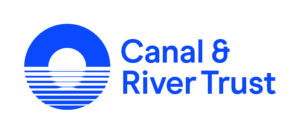







At the University of Northampton, everything we do, from funded trips to paid internships, is to give you everything you need to make a difference when you leave.
If you join our full-time BA Events Management degree at Northampton, you will receive a laptop when your course begins*. The laptops are built to a bespoke custom specification ideal for use in the seminar room, collaborative group work or studying at home.
Whatever your ambitions, we’re here to help you to achieve them. We’ll support you to identify the skills you’re learning during your events management course, find your strengths and secure practical experience so that when it comes to applying for jobs or further study you’ll feel confident in standing out from the crowd. We’ve created the Northampton Employment Promise because we are so confident that if you focus on your studies and complete one of our awards you’ll be highly employable by the time you graduate. Putting you in a great position to secure employment or continue your studies.
To check out the full list of perks, visit our Student Perks page or dedicated International Perks page.
*UK fee payers only (see Terms and Conditions for further details).
The Integrated Foundation Year (IFY) offers a new and exciting route into studying for a degree in Events Management, attracting ambitious and driven students who are willing to learn and advance.
If you have non-standard qualifications or do not quite meet the admissions requirements for the Events Management degree, we can offer you a fantastic opportunity to study a four year Events Management programme which includes a Integrated Foundation Year. The Integrated Foundation Year will help you develop the theoretical/practical and academic skills you need, in order to successfully progress to the full award.
Our four-year courses will enable you to successfully follow the degree pathway of your choice while gaining essential study skills. The foundation year of your chosen degree will be studied on a full-time basis and is aimed at supporting the transition to higher education. Years two, three and four are then studied as a standard degree programme.
Please see our Integrated Foundation Year page for more details.
Our Event Management course uses the active blended learning approach to teaching and learning and weekly sessions are delivered in workshop format, usually for 12 hours per week. Some of your studying will be completed online, enabling you to complete some of the work at a time that is most convenient for you.
You will have a supportive network around you including your course leader and personal tutor. We recommend that you spend 30 hours per week in self-directed study time.
A variety of individual and group-based assessments are used including reports, presentations, posters, e-portfolios, projects, client briefs, and videos.
We have a dedicated YouTube playlist of our student-ran events so you can see the types of events that have been organised in the past.
In previous years Events Management students have participated in an optional study trip to London and an optional study trip to a European destination. The cost of the optional trip to London should not exceed £85 for travel, tours and accommodation, whilst the cost of the optional trip to Europe should not normally exceed £500 for flights and accommodation. You will need to allow an additional £100 for your expenses.
We also aim to provide a regional or national study trip annually to a venue or event. In some cases you will be required to contribute to the cost of entry; this would normally not exceed £50.
*Future study trips are dependent on Government and local travel guides related to Covid-19.
Aisha’s Story Aisha turned her love for live events and music festivals into a professional career as a Senior Event Manager after graduating from the BA (Hons) Events Management degree. Aisha shares her experiences of studying on the course, taking a placement and life after graduation.
Senior Lecturer in Events Management
Faculty of Business and Law
DiscoverSenior Lecturer in Events Management & Tourism
Events Management BA (Hons)
DiscoverSenior Lecturer in Leisure Management
Faculty of Business and Law
DiscoverSenior Lecturer in Events & Hospitality
Faculty of Business and Law
DiscoverSenior Lecturer in Hospitality & Tourism Management
Faculty of Business and Law
DiscoverA wide range of opportunities are available to graduates with an Events Management degree. Event Managers are employed across many sectors of the economy including film, music and entertainment, exhibitions, conferences, networking and social events, events agencies, PR, sports events, tourism, charities and the public sector.
Some of our recent graduates have taken up roles at Silverstone, the De Vere Hotel Group, Communique Promotions and the Ricoh Arena.
On successful completion of your BA Events Management degree, you can further your knowledge and understanding by studying one of our Master’s courses. Benefit from our 20% alumni discount on postgraduate fees to give you a CV that will catch the eye of employers. Some industry related events, hospitality, and tourism Master’s degrees include:
"My time at the University of Northampton was a once in a lifetime experience – unforgettable, interesting, eye-opening, motivating, and inspiring."
When you join the University of Northampton as a BA Events Management degree student, you will have access to many on-campus facilities, study areas, and services.

This course has been specifically designed to meet the needs of tourism employers and to provide you with the qualifications and skills necessary for real-world success.

